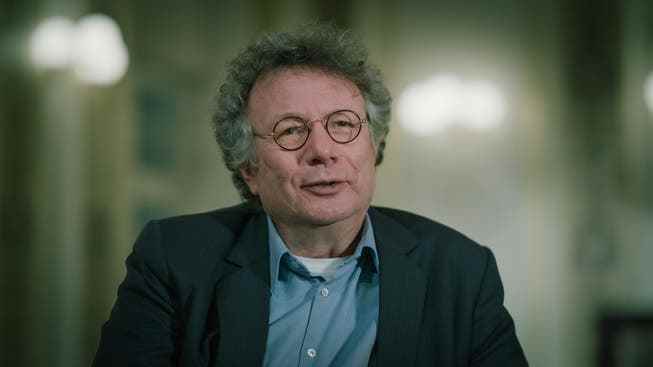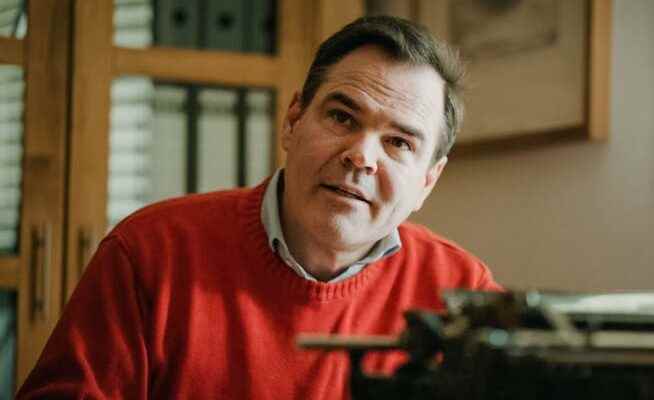When an author and a journalist express themselves in front of the camera, they think they are taking part in a documentary about the tensions between East and West Germany. At the end, Uwe Tellkamp is at the center of the film. The director denies having led those involved down the wrong path.
The author in his habitat: Uwe Tellkamp in the film “The Tellkamp Case”.
Was it all just a misunderstanding? The now famous television documentary “The Tellkamp case – dispute over freedom of expression” actually begins with an unmistakable sentence: “This is the story of a celebrated writer who fell out of favor because of his public positioning and who is now also the author of a long-awaited novel wants to make headlines again.”
It is no coincidence that the film was shown on public television in May this year. Uwe Tellkamp’s new novel “The Sleep in the Clocks” has just been published. The question as to how far the author’s rage against the alleged power of the German opinion mainstream would also be reflected in the book was raised. And that’s where the documentation by director Andreas Gräfenstein, which had been in preparation for a long time, came at just the right time.
Uwe Tellkamp trudging through Dresden with his rucksack or pushing construction plans for his novel back and forth at his desk. Uwe Tellkamp at readings. Last but not least: Uwe Tellkamp at odds with a cosmopolitan left-wing world, which he also sees as a threat to East Germany. “The gully is cosmopolitan. Everything flows in there,” the author yells into the camera.
In “The Tellkamp Case”, in addition to the title hero, a few other actors also have their say. Some of them have now voiced severe criticism of the film. The “Frankfurter Allgemeine Sunday newspaper” quotes the journalist Jana Hensel, among others. She was asked “for a film about Dresden as a mirror of East Germany”, i.e. “about the post-reunification reality” and wanted to provide information about it in a conversation with the director Andreas Gräfenstein. However, assuming that Uwe Tellkamp would only be one of many protagonists in the documentary.
protest and appeasement
The writer Ingo Schulze, who was born in Dresden, also thought he was appearing in a film that told “about ruptures, about polarization in society, about alienation,” as he had been assured. Instead, he found himself in a work that all other interlocutors only “grouped around Tellkamp”. This is obviously how some of those involved among the cultural people and journalists who were also interviewed see it. Ingo Schulze protested by e-mail after the documentary was published and received reassuring answers from the director.

The writer Ingo Schulze unexpectedly found himself in a film about Tellkamp.
“The Tellkamp case” is perhaps symptomatic of the Tellkamp case. The writer’s assertion that one is no longer allowed to state one’s opinions publicly in Germany led to an hour and a half documentary about the writer’s opinions. This documentary was shot with funds from the public broadcasting service that someone like Uwe Tellkamp would probably describe as a classic left-wing mainstream medium.
Compared to the opinion giant Tellkamp, Ingo Schulze looks like a dwarf with his attempt to mediate politically between East and West Germany. Schulze appears in the film for a few minutes, as does Jana Hensel and all the other East German culture people. A little larger in the picture is the Dresden bookseller Susanne Dagen, who runs the Loschwitz bookshop. Meanwhile, a meeting place for a relevant scene and intellectual haven of Uwe Tellkamp.
All of this suggests that an author should be shown in his habitat rather than the really great tensions and misunderstandings between East and West. About the drifting apart of two different hemispheres.
focus has shifted
His film should originally have been called “Drift”, says director Andreas Gräfenstein in an interview with the NZZ. A title he would have preferred to “The Tellkamp Case”. Apparently, the momentum in this matter came from ZDF and increased again when the publication date of the new novel was set.
Gräfenstein openly admits this. Reshoots were made with Uwe Tellkamp, ”the focus on him has shifted,” says the director. “I have never misled anyone I spoke to. At the time the project started, the status quo was what the interviewees knew.»
When Andreas Gräfenstein talks about the microcosm on the Dresden Elbhang, when he talks to his interlocutors about what has happened since 2015, he does so with his own unique method. He doesn’t comment. He lets people talk. It’s quite possible that the filmmaker’s real comment lies in the amount of time he gives his characters. In the editing, a part of reality is cut out, and in the case of “The Tellkamp Case” this author undoubtedly took home the largest piece of the cake. Perhaps to the chagrin of the protagonists, who must now feel like staffage in a Tellkamp legend.
This is not a scandal, but has an aftertaste. On the other hand, since this documentary at the latest, Uwe Tellkamp can no longer complain about being excluded from any discourse.
